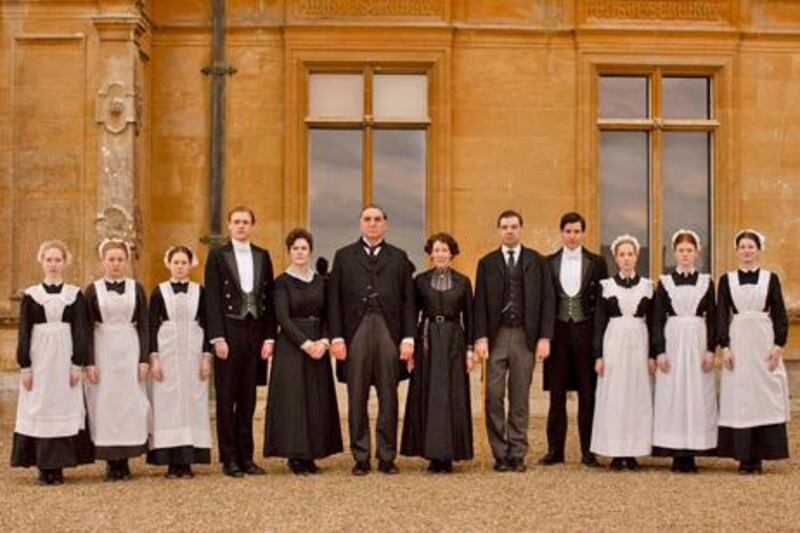As the Downton Abbey creator Julian Fellowes collected his award for Best Mini Series at last Sunday's Golden Globes in Los Angeles, he beamed disbelievingly at the gathered audience of international superstars. "How fabulous this is," he said. "The whole Downton adventure has been an extraordinary one."
He was absolutely right. While one might have expected British audiences to be enthralled by the multilayered tale of life at an English country house in the early 20th century, it's the incredible worldwide success that is genuinely remarkable.
Downton Abbey is broadcast in more than 100 countries across the world (the most recent being the Czech Republic), but it's the Americans who have truly taken the series to their hearts. The season two premiere last week attracted 4.2 million live viewers to the public service broadcaster PBS, and many more are thought to have recorded it. This is double the network's usual prime-time average, and far greater than prestigious shows chronicling more familiar American lives, such as Mad Men. American publishers, reported TheNew York Times, are rushing to re-release books about Edwardian England that mirror the setting of the show, from investigations into British aristocracy to the lives of maids. Such Downton fever was stoked by gushing reviews. "It's a smart, seductive soap opera wrapped in Valentine ribbons," purred the Los Angeles Times. "It is big, beautiful, beautifully acted and romantic, its passions expressed with that particular British reserve that serves only to make them burn brighter."
Which, in a sense, you could also say of the film upon which the Beverly Hills-based Academy of Motion Picture Arts And Sciences bestowed its Best Picture Oscar last year, The King's Speech. The tribulations of a stammering king in 1930s England isn't, perhaps, the most natural attraction for American cinemagoers, but there was something in this period drama that enraptured millions. On a surface level, at least, it played to all the enjoyable clichés of the British male as a repressed, reserved fool surviving on stiff upper lip alone - seen in everything from the disconnected, autocratic father figure in Mary Poppins to anything starring Hugh Grant. The enjoyment, perhaps, comes from when the pressure valve is released and the characters can express their "true" emotions. Become more American, if you like.
But it can't just be the antics of emotionally constrained people living in big houses that pushes the buttons of American viewers. Later in the Los Angeles Times article, the writer proposes that the appeal is in the evocation of an "earlier, more regulated time, when people knew where they stood and where they sat and which silverware to use. American audiences may harbour an additional, transatlantic regard for England as a paradise from which we have, through our own devices, fallen away."
Ironically, Fellowes reminds viewers of Downton Abbey that all these sureties were about to be smashed apart by the First World War. But it is interesting that he has been seen as a chronicler of the class system in early 20th-century Britain - and yet this has still intrigued America, where notions of class are less important. So why has it worked? "What Americans want to see is life in their drama," Fellowes told Time Magazine earlier this month. "Life of all sorts: hard lives, easy lives, or lives which, like most of ours, are a mixture of the two. If we are popular there, then I would suggest, again rather timidly, that we have managed to get some of that into the drawing rooms and sculleries of Downton Abbey."
And, perhaps, that's why Downton hasn't just been popular in the US, but elsewhere too. Sure, there's enjoyment in escaping into archetypal but distant worlds - just as British people might like to watch a Western - but there's more to this than simple reverie for another time. Fellowes's desire to create good television is part of a grand tradition of British period drama. The relationships in these shows, going right back to the likes of Brideshead Revisited and Upstairs, Downstairs, are brilliantly depicted by actors who know the genre inside out. The likes of Dame Maggie Smith (who has won an Emmy for her performance in Downton) or, indeed, Colin Firth in The King's Speech, make these undertakings feel like classically austere, appointment-to-view programming.
But not too classic. At the Golden Globes, the actor Hugh Bonneville, who plays Robert Crawley, the Earl of Grantham in Downton Abbey, attributed its popularity to the fact it's not based on a famous novel. "People tend to love period dramas, but this is one where you don't know the ending, it's not like an adaptation of a book," he said.
All of which will make Fellowes's next undertaking a little more tricky. It's a mini series about the Titanic. And we all know how that one ended.










